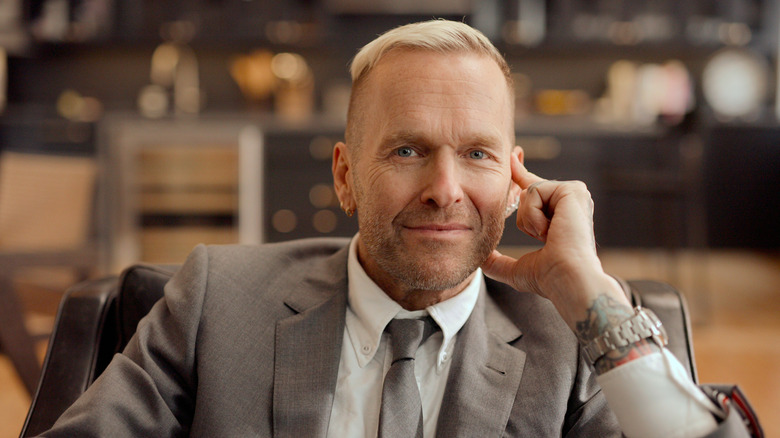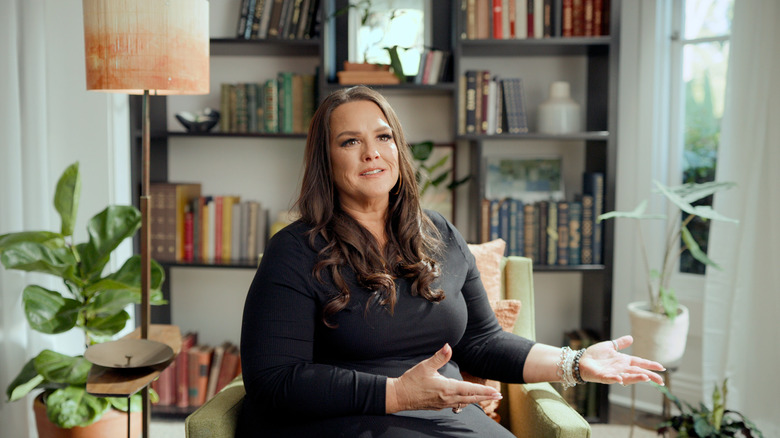A Heartbreaking Netflix Documentary Reveals Just How Damaging The Biggest Loser Is
This article contains discussion of disordered eating, body image, food positivity, and mental health.
If you were alive and had a cable subscription in the 2000s — and even into the 2010s — you've probably heard of "The Biggest Loser." The conceit was simple: trainers like Bob Harper and Jillian Michaels worked with people who applied to the show hoping to lose massive amounts of weight using "traditional" methods like diet and exercise. As it turns out, the show didn't exactly stick to those methods, introducing some weight-loss drugs into the equation ... and beyond that, the show trafficked in abusive treatments, often forcing contestants to starve themselves or "push through" to keep exercising even if it was dangerous.
These are the allegations seen in "Fit For TV," a bombshell documentary from Netflix about how the show was made — and former contestants and even Harper himself spoke to the reality competition show's troubling practices. A doctor who worked on the series, Dr. Robert Huizenga, says directly that he feels as if the show was deeply irresponsible when it came to the way it "convinced" contestants to lose weight by any means necessary, because enormous physical transformations got huge ratings for NBC. "As the show really got popular, some things were being done that I really took issue with," the doctor said. "There were times, unfortunately, when challenges were done that I didn't see or hear about."
Dr. Huizenga even gets emotional during "Fit For TV," saying that he was ostensibly on set to take care of contestants and, in retrospect, feels as if he wasn't given enough information to actually help anyone. Here are some of the biggest relevations from "Fit For TV" about the treatment contestants say they faced while competing on "The Biggest Loser," a reality competition show that ran for 17 seasons ... and may have caused lasting harm for these people who were simply asking for help as they tried to change their lives and get healthier. Before we get into the allegations, let's just make one thing clear: the entire concept of "The Biggest Loser" was to denigrate and mock overweight people, and "Fit For TV" makes it quite clear that every intention behind the show was, frankly, rotten.
Fit For TV details some truly horrifying treatment that allegedly took place on the set of The Biggest Loser
Three contestants shared truly staggering stories in "Fit For TV" — Ryan Benson, who emerged victorious in Season 1, and Danny Cahill and Tracey Yukich, competed in Season 8. (Cahill was the Season 8 winner.) Even Bob Harper shared some genuinely troubling anecdotes, including that producers encouraged him and Jillian Michaels to push the contestants to get physically sick while working out. "Producers loved that sh**," Harper recalled. "They were like, 'We want 'em to puke. We want the madness of it all."
Besides the mental abuse that Michaels inflicted on contestants — which isn't alleged, as it's all on camera during the original series, including moments where she screamed in contestant's faces, made them keep working out after vomiting, and dumped water on them — contestants like Cahill allege that their calories were count and they were given caffeine pills called "stackers" that basically forced their bodies to lose weight faster. "My calorie count was lower than I think it should've been," Cahill shared. "I was eating 800 calories and burning 6,000 to 8,000 a day. When I lowered the calories, I lost more." As for those caffeine pills, Dr. Robert Huizenga was quite clear that they were against the rules: "It was in the show rules, and the patients signed off to that and the trainers signed off to that, and all the producers signed off to that." Apparently, Harper and Michaels were, according to the contestants, providing these stackers anyway.
Benson also made this claim, even saying that before his victory in the Season 1 finale, he stopped eating for over a week. "The last 10 days I didn't put any food in my body," Benson said. "I was doing the master cleanse, just drinking lemon juice and maple syrup, cayenne pepper, all these tricks that are super unhealthy just to cut weight." The result of this was horrifying; as Benson revealed, "At the final weigh-in, we had to do a urine test and they said, 'Ryan, there's blood in your urine,' which obviously means you're so dehydrated."
As for Yukich, she suffered pretty immsensely throughout Season 1 of "The Biggest Loser." In the very first episode of Season 8, Yukich collapsed during an exercise where competitors ran a mile while carrying heavy packs. "I just cheated death," Yukich, who was then hospitalized for rhabdomyolysis (an exercise-related injury that causes muscles to break down) but ultimately elected to return to the competition. "Rhabdomyolysis is your body saying, 'I'm going to shut down on you'," she explains. "It started with my liver, then it went to my kidneys and then it goes to your heart. And that's where I almost died."
This is far from an exhaustive list of the complaints and allegations made by former contestants of "The Biggest Loser" on "Fit For TV," and even though Harper participated in the documentary — seeming to regret many of his actions by doing so in the first place, despite footage of him treating some contestants, including Joelle Gwynn, very horribly — his former coworker Michaels is speaking out.
Jillian Michaels responded to claims made in Fit For TV — and is considering a lawsuit
Jillian Michaels, who worked on nearly every season of "The Biggest Loser," took to Instagram to fight back against allegations made by Dr. Robert Huizenga, Bob Harper, and numerous former contestants in "Fit For TV." Chief among Michaels' pushbacks are that everyone, including Dr. Huizenga and Harper, were aware of the use of "stackers" and caffeine supplements to aid in the weight loss and that the two men not only approved but suggested that contestants take them to help them lose weight more quickly. She also provided what she claims, in a separate post, is proof that she told contestant Olivia Ward, who competed in Season 11, to increase her calorie intake, not decrease it.
Michaels also called TMZ and spoke to head honcho Harvey Levin, claiming that the documentary is "filled with so many lies, and, of course, I have the emails and the text messages to back all this up." Michaels, who said she is considering enlisting attorney Bryan Freedman — who is currently representing Justin Baldoni in the actor's lawsuit against Blake Lively — continued and asked if she should "pursue this legally, [or] do I just do a data dump and give you all the emails and all the receipts?"
Beyond Michaels' alleged treatment of the contestants on "The Biggest Loser," Harper says, in the documentary, that Michaels — his colleage of many years — didn't reach out to him after he suffered a devastating health setback in 2017. Harper says that, after he had a heart attack that year, Michaels remained silent. "We weren't besties, but we were partners on a television show for a very long time," Harper said. After adding that Michaels' silence "spoke volumes to me," he continued, "I would not expect Jillian Michaels to do anything other than what she wants to do." These days, Michaels is a conservative influencer who has aligned herself with the "MAHA" movement, which stands for "Make America Healthy Again" and is spearheaded by HHS Secretary Robert F. Kennedy Jr., and which has come under fire from physicians for multiple reasons.
In any case, it's easy to see that "The Biggest Loser" depicted its contestants cruelly more often than not, despite its overt attempts to paint the show as something that truly helps people "better" themselves. "Fit For TV: The Reality of the Biggest Loser" is streaming in its entirety on Netflix now.
If you need help with an eating disorder, or know someone who does, help is available. Visit the National Eating Disorders Association website or contact NEDA's Live Helpline at 1-800-931-2237. You can also receive 24/7 Crisis Support via text (send NEDA to 741-741).
If you or someone you know needs help with mental health, please contact the Crisis Text Line by texting HOME to 741741, call the National Alliance on Mental Illness helpline at 1-800-950-NAMI (6264), or visit the National Institute of Mental Health website.


